【备考2023】英语 高考语法专项复习 介词和介词短语 课件( 84页PPT)
文档属性
| 名称 | 【备考2023】英语 高考语法专项复习 介词和介词短语 课件( 84页PPT) |  | |
| 格式 | zip | ||
| 文件大小 | 8.9MB | ||
| 资源类型 | 试卷 | ||
| 版本资源 | 通用版 | ||
| 科目 | 英语 | ||
| 更新时间 | 2022-12-14 08:56:11 | ||
图片预览





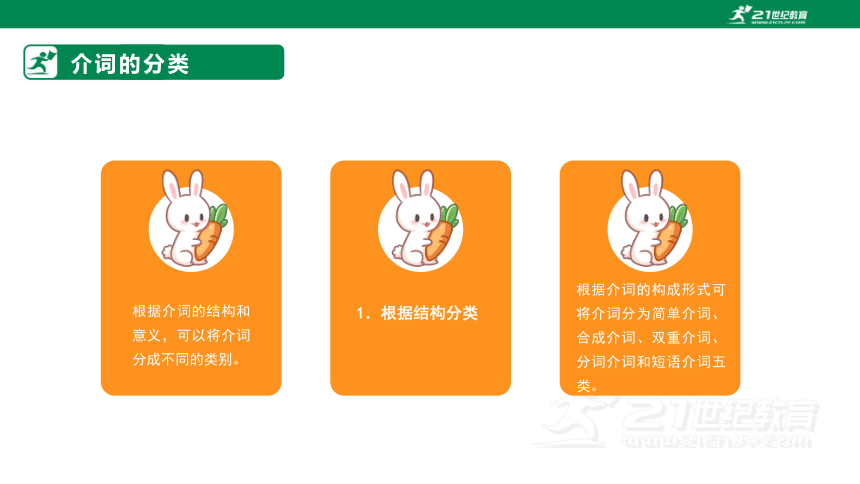
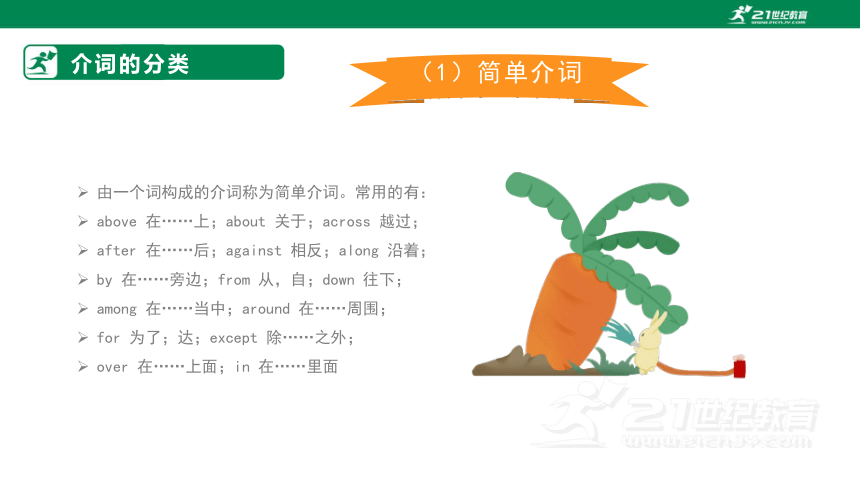
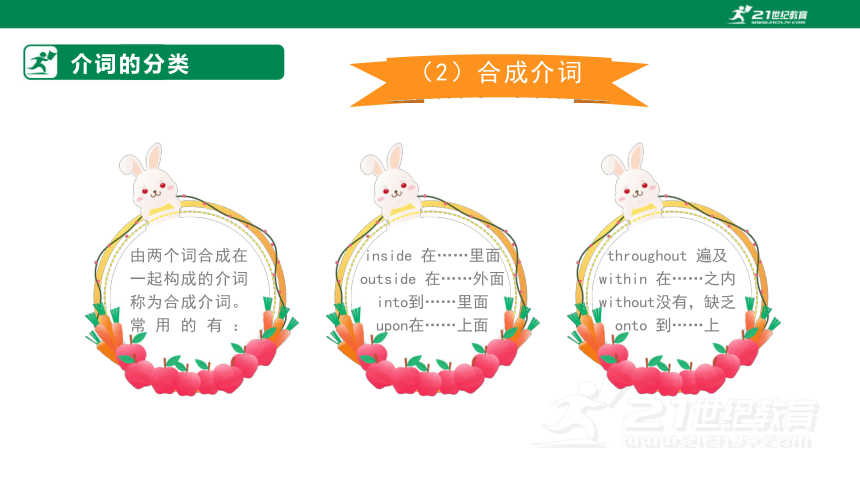

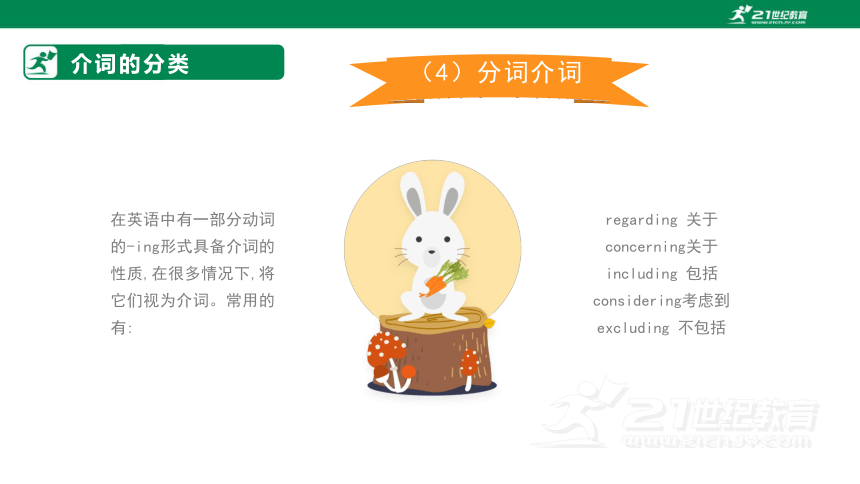

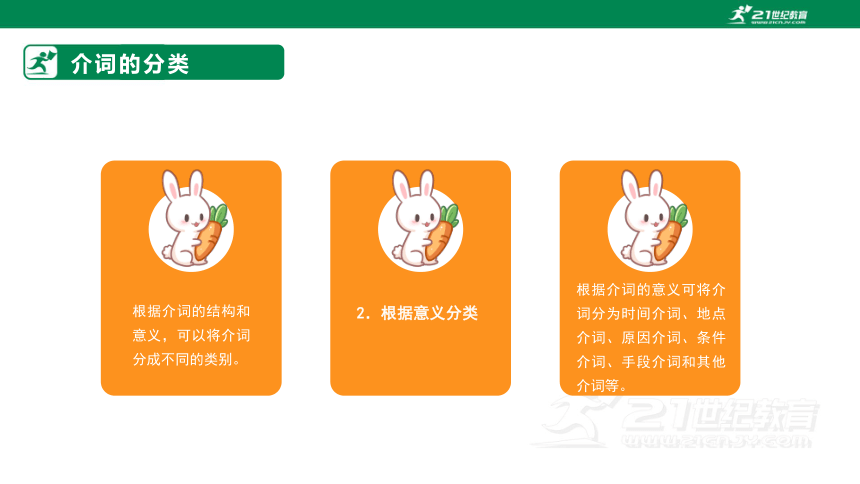
文档简介
(共84张PPT)
介词和介词短语
【备考2023】高考语法专项复习
目录
目录contents
一、介词的分类
二、介词短语与介词短语的语法功能
三、介词的位置
目录
目录contents
四、介词的省略
五、介词与其他词类的搭配
六、几组介词的用法比较
介词和介词短语
用来表明名词、代词等与句中其他词的关系的词叫作介词。
介词是虚词,不能重读,不能单独作句子成分,后面一般有名词、代词或相当于名词的其他词、短语或从句作它的宾语,称为介词宾语,简称介宾。
介词不能单独作句子成分,须后接宾语才能作句子成分。
介词的分类
第
一
章
介词的分类
介词的分类
根据介词的结构和意义,可以将介词分成不同的类别。
1.根据结构分类
根据介词的构成形式可将介词分为简单介词、合成介词、双重介词、分词介词和短语介词五类。
介词的分类
(1)简单介词
由一个词构成的介词称为简单介词。常用的有:
above 在……上;about 关于;across 越过;
after 在……后;against 相反;along 沿着;
by 在……旁边;from 从,自;down 往下;
among 在……当中;around 在……周围;
for 为了;达;except 除……之外;
over 在……上面;in 在……里面
介词的分类
(2)合成介词
由两个词合成在一起构成的介词称为合成介词。常用的有:
inside 在……里面outside 在……外面
into到……里面
upon在……上面
throughout 遍及within 在……之内
without没有,缺乏onto 到……上
介词的分类
(3)双重介词
由两个简单介词重叠在一起构成的介词称为双重介词。常用的有:
from behind 从…后面;from among从…之中
from under从…下;until after 直到…以后
介词的分类
(4)分词介词
在英语中有一部分动词的-ing形式具备介词的性质,在很多情况下,将它们视为介词。常用的有:
regarding 关于
concerning关于including 包括
considering考虑到excluding 不包括
介词的分类
(5)短语介词
由一个或几个简单介词和一个或几个其他词类组合构成的介词称为短语介词。短语介词在意义和作用上相当于一个简单介词。常用的有:
according to 根据;at the back of 在……后面;
in place of 代替;instead of代替,而不是;
because of 因为;at the top of 在……顶上;
due to 因为;thanks to多亏;归功于;
owing to 因为;in front of 在……前面;
in spite of 尽管;regardless of 不管
介词的分类
根据介词的结构和意义,可以将介词分成不同的类别。
2.根据意义分类
根据介词的意义可将介词分为时间介词、地点介词、原因介词、条件介词、手段介词和其他介词等。
介词的分类
(1)时间介词
时间介词指表示时间的介词。常用的有:
in在……(段);at 在……(点);
on 在……(天);before 在……之前;
after在……之后;during 在……期间;
since 自从……以来;until直到……为止;
by 在……之前,不迟于
介词的分类
(2)地点介词
1
地点介词指表示事物之间空间关系和方向的介词。常用的有:
2
in 在……里;under在……下面;
near在……附近;behind 在……后面;
on the left of 在……左面;
on 在……上面;beside 在……旁边;
between 在……之间;onto到……上;
off 离开;on the right of 在……右面;
at 在……里/上;in front of在……前面; below 在……下面;
in the middle of在……中间;
介词的分类
(3)原因介词
原因介词是表示事物发生、发展的原因的介词。常见的有:
because of 由于
at 因为
for 因为
with 因为
介词的分类
(4)条件介词
条件介词主要指表述的事情成立的条件的介词。
but for要不是;in case of 万一;
considering 假若
介词的分类
(5)手段介词
手段介词主要指表示做某件事的方法和手段的介词。常用的有:
by 通过,使用
with 用;以
介词的分类
(6)其他介词
about 关于;on 关于;of 具有;
with 带有;without没有;
instead of 代替;but 除……以外;
except 除……以外;besides 除……以外
介词短语与其语法功能
第
二
章
介词短语与介词短语的句法功能
介词短语
介词不能单独作成分,必须与其后的宾语构成介
词短语才能作成分。介词后的宾语可以是名词、
代词、动词-ing形式、疑问词+不定式、从句等。
介词短语
eg:Have you read about Alberta
你读过有关阿尔伯塔的资料吗?(名词作介词宾语)
eg:We will go without you if you can't come on time.如果你不能按时来我们就不等你了。
(代词作介词宾语)
介词短语
eg:Have you read about Alberta
你读过有关阿尔伯塔的资料吗?(名词作介词宾语)
eg:We will go without you if you can't come on time.如果你不能按时来我们就不等你了。
(代词作介词宾语)
eg:Your success will largely depend on what you do and how you do it. (从句作介词宾语) 你的成功很大程度上取决于你做什么和如何做。
介词短语的句法功能
介词短语的句法功能介词短语在句中可以作状语、定语、表语、补足语等。
介词短语的句法功能
(1)作状语
1
介词短语作状语的用法最多,可以表示时间、地点、方式、条件、目的、原因等:
2
eg:I have lived in London since 2005.
自2005年以来我就一直住在伦敦。(表示时间)
eg:You can wait for me at the school gate.I will pick you up then.(表示地点)
你可以在学校门口等我,到时候我去接你。
eg:We go to school on foot every day.
我们每天步行去上学。(表示方式)
介词短语的句法功能
(1)作状语
1
介词短语作状语的用法最多,可以表示时间、地点、方式、条件、目的、原因等:
2
eg:In case of fire,open this safety door.
一旦发生火灾时,打开这扇安全门。(表示条件)
eg:We held a party in honor of our friends.
我们举行宴会款待朋友。(表示目的)
eg:The picnic was put off till next Sunday because of the rain.(表示原因)
因为下雨,野餐推迟到了下个周日。
介词短语的句法功能
(2)作定语
介词短语作定语时常放在被修饰词或短语的后面。
eg:The cup on the table is my father's.桌子上的杯子是我父亲的。
作定语,
修饰 the cup
eg:Who is the man in the middle
中间那位男士是谁?
作定语,
修饰 the man
介词短语的句法功能
(3)作表语
介词短语作表语可以放在连系动词之后。
eg:The Wangs arc on holiday in Shanghai now. 王先生一家现在正在上海度假。 作表语
介词短语的句法功能
(3)作表语
eg:We are of the same age.
我们年龄一样大。
eg:The book you want is on the table.
你要的那本书在桌子上。
介词短语的句法功能
(4)作补足语
eg:They must keep their hands behind their backs.
他们必须把手放在背后。 一作宾语补足语
eg:When I woke up,I found myself in a strange place.
醒来后我发现自己在一个陌生的地方。
eg:Don't leave your books all over the desk.
不要把你的书放得满桌子都是。
介词的位置
第
三
章
介词的位置
介词的位置
介词的正常位置是在其宾语之前并且与宾语紧紧相连,但有时介词与其宾语也会相隔较远或出现在宾语之后。
介词的位置
(1)在疑问句中
一般说来,疑问词whom,which,what,whose,where等作介词的宾语时,构成“介词+疑问词”,放于句首,但在非正式文体中,总是将介词移至句末。
eg:To whom can I turn for help?(正式)
eg:Whom can I turn to for help?(非正式)
我可以找谁帮忙呢?
介词的位置
(1)在疑问句中
【拓展】
① 在口语中,如果是承接上文的简略回答,此时常把介词置于句末。但如果what,whose,which等作定语,介词一般放在句首。
eg:-We're going to buy a new car.
我们要买一辆新车。
-What with 用什么买?
eg:-The Blacks are going to Hong Kong tomorrow. 布莱克一家明天要去香港。
-On which flight 乘哪一班飞机?
介词的位置
(1)在疑问句中
【拓展】
② 在含有系动词be的疑问句中,介词通常置于句末。
eg:What is the weather like
天气怎么样?
eg:What movies are you interested in
你对什么样的电影感兴趣?
介词的位置
(2)在定语从句中
1
在正式文体中,通常将介词放在作其宾语的关系代词之前;但在非正式文体中,经常将介词放于从句末,且多省略关系代词。
2
eg:The hotel at which we stayed is a five-star hotel.(正式)
eg:The hotel(which) we stayed at is a five-star hotel(非正式)
我们住的旅馆是五星级的。
介词的位置
(3)介词宾语放在句首
在口语中,若要加强语气,常将介词的宾语移到句首而将介词保留在原来的位置。
eg:What you said I don't agree with.
我不赞成你所说的话。
(正常语序为:I don't agree with what you said.)
eg:Dance I am interested in, but music I am not.
我喜欢舞蹈,但不喜欢音乐。
(正常语序为:I am interested in dance, but I am not interested in music.)
介词的省略
第
四
章
介词的省略
介词的省略
一般来说介词是不可省略的,但在一些特殊表达或固定搭配中,有些介词是可以省略的。介词的省略主要有如下几种情况:
介词的省略
(1)in的省略
在下列短语中,in常被省略。
spend...(in)doing...做……花费……;
have a good time(in)doing...做……高兴;
have difficulty/trouble(in)doing...
做……有困难;
(in)this/that way 以这种/那种方法
介词的省略
(2)on的省略
1
口语中,尤其是美式英语口语中,星期几之前的
on可以省略。
2
eg:I usually stay at home (on) Sundays.
星期天我通常待在家里。
eg:The routine meeting takes place (on) Monday morning.
例会星期一上午举行。
介词的省略
(3)of的省略
of在下列两种结构中常省略:
(1)“be+of+度量名词”结构中 of的省略
这一省略形式主要是在口语中,尤其是在thesame 前 of常省略。常见的度量名词主要有:length(长度),height(高度),depth(深度), width(宽度),weight(重量),area(面积), volume(体积),size(大小),shape(形状), type(类型),colour(颜色),age(年龄), material(材料)等。
eg:When I was (of) your age,I knew much less than you. 我在你这个年龄时,比你知道的少得多。
eg:The desks in our class are (of) the same colour, material,shape,height and length. 我们教室里书桌的颜色、材料、形状、高度和长度都一样。
介词的省略
(3)of的省略
(2)在“what+度量词”之前的of的省略eg:(Of) What colour is your new dress 你的新裙子是什么颜色的?
eg:(Of) What weight are you 你多重?
(3)of 省略的其他情况
① be of no use中 of的省略。
eg:Take this-it's (of) no use to me anymore.拿着这个,我再也用不着它了。
eg:It's (of) no use working late into the night.工作到深夜也没用。
② 在名词之后的“of+度量词”中的of几乎总是保留着,但在度量名词之前有that时,of常被省略。
eg:Kate likes to make friends with girls of her own age.特喜欢和同龄人交朋友。
eg:Have you ever seen any fish (of)that size
你有没有见过那样大小的鱼?
介词的省略
“for+一段时间或距离”中的for在日常口语中有时会被省略,尤其是在肯定句中。
(4)for的省略
eg:They have been sleeping (for) a whole winter. 它们睡了整整一个冬天。
eg:The Mountain chain stretches (for) thousands of miles.
这座山脉绵延数千英里。
介词的省略
【拓展】
① for在否定句或句首时不可省略。
eg:We haven't seen each other for a long time. 我们很长时间没见面了。
eg:For a whole month,there is no rain.
整整一个月没有下雨。
(4)for的省略
② all后有表示时间段的名词时,其前不用for。
eg:I have been staying here all day.
我一整天都待在这里。
eg:The weather here is freezing cold all year. 这里全年都很冷。
介词的省略
(5)to的省略
(1)双宾语中介词to的省略
在双宾语结构中,通常间接宾语前都有介词to,但在被动语态中,直接宾语变成主语时,to常省略。
eg:Those dolls will be given (to) my little girl. 那些玩偶将送给我的小女儿。
(2) write to sb.中的 to在口语中常省略
eg:They write (to) their parents every week.他们每星期都给他们爸妈写信。
介词的省略
(6)and/or之后介词
的省略
1
and/or连接两个介词短语中的介词若相同,第二个介词常被省略。
2
eg:We selected models in Brazil and (in) Russia.
我们在巴西和俄国选择模特。
eg:It is a matter of truth and (of) fallacy.
这事关真理和谬误。
介词的省略
(6)and/or之后介词
的省略
1
【拓展】
① 以this,that,next,last,one,every,each,some,any,all开头的表示时间的短语之前的at,on,in通常要省略。
2
this morning 今天早晨;that day 那天;
every Sunday 每个星期天;last month上月
each week 每周;any day 任何一天;
介词的省略
(6)and/or之后介词
的省略
1
【拓展】
② today,tomorrow,yesterday,the day after tomorrow, the day before yesterday 等作时间状语时为副词,其前不用介词。
2
today 今天;tonight 今晚;
the year before last 前年;
the day after tomorrow 后天;
介词与其他词类的搭配
第
五
章
介词与其他
词类的搭配
介词与其他词类的搭配
介词具有较强的搭配能力,它可与名词、动词、形容词等一起构成各种搭配。
介词与其他词类的搭配
(1)与名词搭配
(1)介词与后面的名词构成搭配
at first 起初;at night 在夜间;at noon 在中
at school在上学;at once 立刻 ;at present 目前
at the cinema 在电影院;at Christmas 在圣诞节
at the moment 此刻; by the way 顺便问一下
for example 例如;in English 用英语
in ink 用墨水,用钢笔;in time 及时
in danger 处于危险之中;in town 在城里
in the countryside 在乡下;in the day在白天
in silence 无声地;of course 当然
on the way to 在去……的路上;on time 按时
over the weekend 整个周末
介词与其他词类的搭配
(1)与名词搭配
(2)介词与前面的名词构成搭配
access to 进入……的方法/通道;access to 进入……的方法/通道;
approach to……的方法;blame for 对……的责任
cause of……的原因;charge for 对……的索价
delay in……的延迟;desire for 对……的渴望
lack of 缺乏;love for 对……的爱
difficulty with 在……方面的困难;faith in 对……的信仰,信奉
hunger for 对……的渴望;pride in 对……的骄傲
reason for ……的原因;respect for 对……的尊重
response to 对……的反应;
interest in 对……的兴趣;success in在……方面的成功
介词与其他词类的搭配
(2)与动词搭配
1
介词可以与其前面的动词构成固定搭配,一般说来这样的动词都是不及物动词,与介词共同构成及物动词,后面跟宾语。
2
ask for 要求得到;agree with 同意;depend on 依靠;differ from 与……不同;get on 上车;get to 到达;insist on 坚持;hear from 收到……来信;look at 看;look after 照顾;knock at/on 敲门;listen to 听;
learn from 向……学习;look for 寻找;put on 呈现;
operate on 给……做手术;run into 碰到;撞上;
shout at对……吼叫;stand for 代表;stick to 坚持;
succeed in 在……取得成功;wait for等待;
worry about为……担忧;write to 给……写信;
介词与其他词类的搭配
(3)与形容词搭配
介词可以与其前面的形容词构成固定搭配:
absent from 缺席,不在;
afraid of 对……感到害怕;
angry about sth.对某事感到生气;
angry with sb.对某人感到生气;
aware of意识到;bad for 对……有害;
busy with 忙于;due to……由于;
different from 与……不同;
familiar to 为……所熟悉;
famous for 以……出名;full of 充满
good at 擅长;late for迟到;
good/bad for 对……有好处/害处
interested in 对……感兴趣;
kind to 对……和蔼;
near to 离……近;
pleased with 对……感到高兴;
polite to 对……有礼貌;
ready for 为……做好准备;
sorry for为……感到抱歉;
strict with 对……要求严格;
surprised at 对……感到惊奇;
介词与其他词类的搭配
at the cost of 以……为代价;
at the sight of 一看见;at a speed of 以……的速度
at the time of 在……的时候;by means of 借助于;
at the top of 在……顶部;for fear of 唯恐;
for lack of 因为缺乏;for the good of 为了……的利益
for the purpose of 为了……目的;in case of 要是;
for the sake of 为了……的缘故;in charge of 负责;
in addition to 除了……外;in control of 控制,管理
in danger of 处于……的危险之中;
in the direction of 沿着……的方向;
in the event of 假如,万一;up to直到;由……而定;
(4)其他常用短语
几组介词的用法比较
第
六
章
几组介词的
用法比较
几组介词的用法比较
(1)时间介词at,on,in
(1)at用在表示某一具体 时刻,或把某一段时间看做
某一时刻的词前及某节假日的名词前:
at 7:30 在七点半;at Christmas 在圣诞节;
at noon 在正午;at midnight 在半夜;
at that time 在那时;at the end 最终;
at the beginning of 在……开始时;
at the beginning 开始;
几组介词的用法比较
(1)时间介词at,on,in
(2)on用在表示具体的日期,星期几,节日,或具体
的某一天及具体某一天的上午、中午、晚上等的词前
on Monday 在星期一;
on the following day 在第二天;
on May the first 在五月一日;
on New Year's Day 在元旦;
on a rainy day 在一个下雨天;
on a cold day 在一个寒冷的日子;
on Monday morning 在星期一的早晨;
on the weekend 在周末;
on the following evening 在第二天傍晚;
on the morning of April the first 在四月一日上午
几组介词的用法比较
(1)时间介词at,on,in
(3)in用于表示较长时间的词,如年份、季节、月等或表示上午、下午、晚上的词前
in the morning/afternoon/evening
在早晨/下午/晚上
in the daytime/night 在白天/夜里
in a day/week/month/year
在一天/一周/一个月/一年内
in spring/summer/autumn/winter
在春天/夏天/秋天/冬天
in(the year)2016 在2016年;in August 在八月
in the 21st century 在21世纪
in one's life 在(某人)一生中
几组介词的用法比较
(2)时间介词during,in
1
during和in都表示一段时间。但during更加强调时间的延续,因此,它可以表示在某段时间内自始至终的状态,谓语一般是延续性动词。当我们要准确说出某动作发生的时间时,就要用in。
2
eg:Come to see me during/in the afternoon.
下午来看我。
eg:During the meeting we talked about the plan.
会议期间我们谈论那个计划。
eg:The accident happened in the morning.
事故发生在早晨。
几组介词的用法比较
(3)时间介词in,after
(1)“in+一段时间”表示以说话时间为起点的将来一段时间之后,常与将来时连用
eg:My father will be back from abroad in three days.
3天后我的父亲就会从国外回来。
(2)“after+一段时间”表示从过去或将来某个时间为起点的一段时间之后:
eg:After twodays' travel, the girls began to realize that Canada is quite empty.旅行两天后,这些女孩开始意识到加拿大人烟稀少。
(3)after可与表示时间点的词连用,表示过去或将来的概念;而in不可:
eg:I'll go and see her after three o'clock.
3点以后我去看她。
eg:They went to the movie after supper.
晚饭后他们去看电影了。
几组介词的用法比较
(1)“for+时间段”表示“(延续)……之久”。可表示延续到现在的一段时间(作完成时的时间状语),或表示一段已经终结了的时间(作过去时的时间状语),或表示将要延续的一段时间(作将来时的时间状语)的时间状语),或表示将要延续的一段时间(作将来时的时间状语):
(4)时间介词for,since
eg:They have lived in China for two years.
他们在中国已经住了两年。
eg:They lived in China for two years.
他们在中国住过两年。
eg:They will live in China for two years.
他们将在中国住上两年。
几组介词的用法比较
(2)“since+时间点”表示“从过去某时延续至今的
一段时间”,与完成时连用:
(4)时间介词for,since
eg:Festivals and celebrations of all kinds have been held everywhere since ancient times.
从古时候起各种节日和庆祝活动就在各处举行。
eg:I've been living in this town since August.
我从8月开始一直住在这个镇上。
几组介词的用法比较
(5)时间介词by,before
by表示“不迟于某时”,包括某时在内;before则表示“在某时之前”,不包括某时在内。试比较:
eg:I will finish the work by Friday.
最晚星期五我就会完成这项工作。(包括星期五)
eg:I will finish the work before Friday.
星期五之前我会完成这项工作。(不包括星期五)
几组介词的用法比较
(6)地点介词 on/beneath,in,above/below,over/under
1
(1)on指与物体表面接触,在某物体的表面上;反义词为beneath:
2
eg:You've got mud on your shoes.
你的鞋上沾了泥。
eg:There is a shadow on the wall.
墙上有个影子。
几组介词的用法比较
(6)地点介词 on/beneath,in,above/below,over/under
1
(2)in表示“在……上”时,暗示占据了某物的一部分
eg:There is a hole in the wall. 墙上有个洞。
2
(3)above表示“在……上”时是指离开物体表面在并不一定垂直的上方;反义词为below:
eg:The plane flew above the clouds.
飞机在云层之上飞行。
eg:The mountain is about 2,000 metres above the sea.
那座山海拔约2,000米。
几组介词的用法比较
(6)地点介词 on/beneath,in,above/below,over/under
1
(4)over表示“在·····上”时是指在物体的正上方,有时表示“覆盖;越过”;反义词为under:
2
eg:A lamp was hanging over the table.
桌子上方吊着一盏灯。
eg:I saw a stone bridge over the river.
我看见一座石桥横跨在河上。
eg:The thief climbed over the wall and ran away.
那个贼翻过围墙逃走了。
几组介词的用法比较
(7)方位介词between,among
(1)between 表示某人或某物“在两者之间”,常用“between A and B”或“between+复数名词”结构
eg:The little girl was sitting between her parents.
那个小女孩坐在她父母中间。
(2)among 表示某人或某物“在三者或三者以上之。间”,其所在范围内的人或物通常视为一个整体:
eg:Among the rare animals are cranes, black bears, leopards and tigers.在这些珍稀动物中有白鹤、黑熊、豹以及老虎。
(3)between 在接三者或三者以上的物体时,是把这些物体分别看待,指每两者之间:
eg:The basketball game will be held between France,German, Australia and America.
篮球赛将在法国、德国、澳大利亚和美国之间举行。
几组介词的用法比较
through 和 across都表示“穿过”。through表示从内部穿过,与in有关;across表示从表面上通过,与on有关;past表示从旁边经过;over表示从上方跨过。
(8)方位介词through,across,past,over
eg:The signals go through glass, doors and walls.
信号能穿透玻璃、门和墙壁。
eg:During the day, we'll walk across the land,following the footprints of big animals.
白天,我们将循着一些大型动物的足迹穿越大地。
eg:They drove past a big supermarket.
他们开车经过一家大超市。
eg:The plane flew over the Great Wall.
飞机飞过长城。
几组介词的用法比较
(9)方位介词 in front of, in the front of
in front of 指在某物体外部的前面;in the front of指在某物体内部的前面。
eg:We planted some trees in front of our house. 我们在房前种了一些树。 (在房子外部)
eg:He sat in the front of the bus.
他坐在公共汽车的前面。(在车子内部)
几组介词的用法比较
(10)表示“除……外”的except,besides,
except for
1
except表示“除···之外(其他的都)”,其后 的宾语是被排除在外的;besides 表示“除……之外(其他的也)”,其后的宾语是被包括在内的;except for后被排除的内容与主语往往不是同一类。
2
eg:All the students took part in the sports meeting except Tom.(不包括Tom)
除了汤姆以外,其他的同学都参加了运动会。
eg:We need three more chairs besides these two.
除了这两把椅子之外我们还需要三把。(包括这两把椅子)
eg:All the buildings are excellent except for their location.(暗含 location与building不是一类)
除了位置之外,所有的建筑都相当不错。
几组介词的用法比较
(11)表示工具、手段、材料的with,by,in
表示工具、手段、材料时,with,by,in都表示“用”。with多指用具体的工具;by指使用的方法;in则指使用的语言或工具的具体类型。
eg:I cut the cake with a knife.
我用刀子切开了蛋糕。
eg:He made a living by selling newspapers.
他靠卖报为生。
eg:Don't write these numbers in pencil. Write them in ink. 不要用铅笔写这些数字,要用钢笔写。
同步演练
1.(浙江高考)That young man is honest,cooperative, always there when you need his help._____ short, he's reliable.
2.(重庆高考)Last year was the warmest year on record, with global temperature 0.68℃ _____ the average.
3.(安徽高考)They believe that there are transport developments _____ the corner that will bring a lot of changes for the better.
4.(浙江高考)Most people work because it's unavoidable._____ contrast,there are some people who actually enjoy work.
【语法填空】
同步演练
5.(浙江高考)These comments came in response _____ specific questions often asked by local newsmen.
6.(福建高考)Human life is regarded as part of nature and, as such, the only way for us to survive is to live in harmony _____ nature.
7.(陕西高考)The little pupil took his grandma _____ the arm and walked her across the street.
8(重庆高考)She drove so fast at the turn that the car almost went _____ the road.
9.(福建高考)Our club is open to everyone regardless _____age,sex or educational background.
【语法填空】
同步演练
10.(江西高考)It is unbelievable that Mr Lucas leads a simple life _____ his great wealth.
11. I suddenly noticed the note on the desk, which reminded me _____ the lecture.
12. He politely told the woman he didn't have a watch and had no idea _____ the time.
13. Jimmy said he just helped someone _____ need.
14. It was a good concert-I enjoyed the last one _____ particular.
15.He's now leaving Beijing ___ Paris on Flight 274.
16. We encourage you to discuss the books you read _____others.
【语法填空】
同步演练
【语法填空】
答案解析
1
【答案】In ;【解析】in short 简言之。;
【句意】那个年轻人诚实且有合作精神,当你需要他帮忙的时候,他总是在那儿。简言之,他是值得信赖的。
2
【答案】above;【解析】根据语境可知此处表示“在……之上,高于”,所以要用介词above。
同步演练
【语法填空】
答案解析
3
【答案】around ;【解析】around the corner 就要到来
【句意】他们相信交通的发展就要到来了,这将会带来很多更好的变化。
4
【答案】By;【解析】by contrast相比之下,对比而言;
【句意】大多数人工作是因为那是不可避免的,相比之下,还有一些人是真的喜欢工作。
同步演练
【语法填空】
答案解析
5
【答案】to ;【解析】in response to 作为对……的回应;
【句意】对于当地新闻记者常常问起的特定问题,这些评论正好作出了回复。
6
【答案】with;【解析】in harmony with 与……协调;
【句意】人类生活被认为是大自然的一部分,严格说来,我们生存的唯一方式是与大自然和睦相处。
同步演练
【语法填空】
答案解析
7
【答案】by;【解析】take sb. by the arm“挽着某人的手臂”。此处的by表示“抓着(物体或身体的某个部位)”;
8
【答案】off;【解析】off离开,偏离。
【句意】她在转弯处开得如此快,以至于车差点偏离公路。
同步演练
【语法填空】
答案解析
9
【答案】of;【解析】regardless of不管,不顾;
【句意】我们的俱乐部对所有人开放,不分年龄、性别和教育背景。
10
【答案】despite;【解析】despite尽管;
【句意】令人难以置信的是,尽管很富有,Lucas先生过着简朴的生活。
同步演练
【语法填空】
答案解析
11
【答案】of;【解析】remind sb.of sth.“使某人想起某事物”,是固定用法。
12
【答案】of ;【解析】have no idea of sth.“不知道某事物”,是固定用法。
同步演练
【语法填空】
答案解析
13
【答案】in;【解析】in need“陷入困境”,是固定短语。
14
【答案】in ;【解析】in particular“尤其,特别”,是固定短语。
同步演练
【语法填空】
答案解析
15
【答案】for ;【解析】leave...for...表示“离开……去……”,是固定用法。
16
【答案】with ;【解析】discuss sth.with sb.“与某人讨论某事物”, 是固定用法。
谢谢
21世纪教育网(www.21cnjy.com)
中小学教育资源网站
兼职招聘:
https://www.21cnjy.com/recruitment/home/admin
介词和介词短语
【备考2023】高考语法专项复习
目录
目录contents
一、介词的分类
二、介词短语与介词短语的语法功能
三、介词的位置
目录
目录contents
四、介词的省略
五、介词与其他词类的搭配
六、几组介词的用法比较
介词和介词短语
用来表明名词、代词等与句中其他词的关系的词叫作介词。
介词是虚词,不能重读,不能单独作句子成分,后面一般有名词、代词或相当于名词的其他词、短语或从句作它的宾语,称为介词宾语,简称介宾。
介词不能单独作句子成分,须后接宾语才能作句子成分。
介词的分类
第
一
章
介词的分类
介词的分类
根据介词的结构和意义,可以将介词分成不同的类别。
1.根据结构分类
根据介词的构成形式可将介词分为简单介词、合成介词、双重介词、分词介词和短语介词五类。
介词的分类
(1)简单介词
由一个词构成的介词称为简单介词。常用的有:
above 在……上;about 关于;across 越过;
after 在……后;against 相反;along 沿着;
by 在……旁边;from 从,自;down 往下;
among 在……当中;around 在……周围;
for 为了;达;except 除……之外;
over 在……上面;in 在……里面
介词的分类
(2)合成介词
由两个词合成在一起构成的介词称为合成介词。常用的有:
inside 在……里面outside 在……外面
into到……里面
upon在……上面
throughout 遍及within 在……之内
without没有,缺乏onto 到……上
介词的分类
(3)双重介词
由两个简单介词重叠在一起构成的介词称为双重介词。常用的有:
from behind 从…后面;from among从…之中
from under从…下;until after 直到…以后
介词的分类
(4)分词介词
在英语中有一部分动词的-ing形式具备介词的性质,在很多情况下,将它们视为介词。常用的有:
regarding 关于
concerning关于including 包括
considering考虑到excluding 不包括
介词的分类
(5)短语介词
由一个或几个简单介词和一个或几个其他词类组合构成的介词称为短语介词。短语介词在意义和作用上相当于一个简单介词。常用的有:
according to 根据;at the back of 在……后面;
in place of 代替;instead of代替,而不是;
because of 因为;at the top of 在……顶上;
due to 因为;thanks to多亏;归功于;
owing to 因为;in front of 在……前面;
in spite of 尽管;regardless of 不管
介词的分类
根据介词的结构和意义,可以将介词分成不同的类别。
2.根据意义分类
根据介词的意义可将介词分为时间介词、地点介词、原因介词、条件介词、手段介词和其他介词等。
介词的分类
(1)时间介词
时间介词指表示时间的介词。常用的有:
in在……(段);at 在……(点);
on 在……(天);before 在……之前;
after在……之后;during 在……期间;
since 自从……以来;until直到……为止;
by 在……之前,不迟于
介词的分类
(2)地点介词
1
地点介词指表示事物之间空间关系和方向的介词。常用的有:
2
in 在……里;under在……下面;
near在……附近;behind 在……后面;
on the left of 在……左面;
on 在……上面;beside 在……旁边;
between 在……之间;onto到……上;
off 离开;on the right of 在……右面;
at 在……里/上;in front of在……前面; below 在……下面;
in the middle of在……中间;
介词的分类
(3)原因介词
原因介词是表示事物发生、发展的原因的介词。常见的有:
because of 由于
at 因为
for 因为
with 因为
介词的分类
(4)条件介词
条件介词主要指表述的事情成立的条件的介词。
but for要不是;in case of 万一;
considering 假若
介词的分类
(5)手段介词
手段介词主要指表示做某件事的方法和手段的介词。常用的有:
by 通过,使用
with 用;以
介词的分类
(6)其他介词
about 关于;on 关于;of 具有;
with 带有;without没有;
instead of 代替;but 除……以外;
except 除……以外;besides 除……以外
介词短语与其语法功能
第
二
章
介词短语与介词短语的句法功能
介词短语
介词不能单独作成分,必须与其后的宾语构成介
词短语才能作成分。介词后的宾语可以是名词、
代词、动词-ing形式、疑问词+不定式、从句等。
介词短语
eg:Have you read about Alberta
你读过有关阿尔伯塔的资料吗?(名词作介词宾语)
eg:We will go without you if you can't come on time.如果你不能按时来我们就不等你了。
(代词作介词宾语)
介词短语
eg:Have you read about Alberta
你读过有关阿尔伯塔的资料吗?(名词作介词宾语)
eg:We will go without you if you can't come on time.如果你不能按时来我们就不等你了。
(代词作介词宾语)
eg:Your success will largely depend on what you do and how you do it. (从句作介词宾语) 你的成功很大程度上取决于你做什么和如何做。
介词短语的句法功能
介词短语的句法功能介词短语在句中可以作状语、定语、表语、补足语等。
介词短语的句法功能
(1)作状语
1
介词短语作状语的用法最多,可以表示时间、地点、方式、条件、目的、原因等:
2
eg:I have lived in London since 2005.
自2005年以来我就一直住在伦敦。(表示时间)
eg:You can wait for me at the school gate.I will pick you up then.(表示地点)
你可以在学校门口等我,到时候我去接你。
eg:We go to school on foot every day.
我们每天步行去上学。(表示方式)
介词短语的句法功能
(1)作状语
1
介词短语作状语的用法最多,可以表示时间、地点、方式、条件、目的、原因等:
2
eg:In case of fire,open this safety door.
一旦发生火灾时,打开这扇安全门。(表示条件)
eg:We held a party in honor of our friends.
我们举行宴会款待朋友。(表示目的)
eg:The picnic was put off till next Sunday because of the rain.(表示原因)
因为下雨,野餐推迟到了下个周日。
介词短语的句法功能
(2)作定语
介词短语作定语时常放在被修饰词或短语的后面。
eg:The cup on the table is my father's.桌子上的杯子是我父亲的。
作定语,
修饰 the cup
eg:Who is the man in the middle
中间那位男士是谁?
作定语,
修饰 the man
介词短语的句法功能
(3)作表语
介词短语作表语可以放在连系动词之后。
eg:The Wangs arc on holiday in Shanghai now. 王先生一家现在正在上海度假。 作表语
介词短语的句法功能
(3)作表语
eg:We are of the same age.
我们年龄一样大。
eg:The book you want is on the table.
你要的那本书在桌子上。
介词短语的句法功能
(4)作补足语
eg:They must keep their hands behind their backs.
他们必须把手放在背后。 一作宾语补足语
eg:When I woke up,I found myself in a strange place.
醒来后我发现自己在一个陌生的地方。
eg:Don't leave your books all over the desk.
不要把你的书放得满桌子都是。
介词的位置
第
三
章
介词的位置
介词的位置
介词的正常位置是在其宾语之前并且与宾语紧紧相连,但有时介词与其宾语也会相隔较远或出现在宾语之后。
介词的位置
(1)在疑问句中
一般说来,疑问词whom,which,what,whose,where等作介词的宾语时,构成“介词+疑问词”,放于句首,但在非正式文体中,总是将介词移至句末。
eg:To whom can I turn for help?(正式)
eg:Whom can I turn to for help?(非正式)
我可以找谁帮忙呢?
介词的位置
(1)在疑问句中
【拓展】
① 在口语中,如果是承接上文的简略回答,此时常把介词置于句末。但如果what,whose,which等作定语,介词一般放在句首。
eg:-We're going to buy a new car.
我们要买一辆新车。
-What with 用什么买?
eg:-The Blacks are going to Hong Kong tomorrow. 布莱克一家明天要去香港。
-On which flight 乘哪一班飞机?
介词的位置
(1)在疑问句中
【拓展】
② 在含有系动词be的疑问句中,介词通常置于句末。
eg:What is the weather like
天气怎么样?
eg:What movies are you interested in
你对什么样的电影感兴趣?
介词的位置
(2)在定语从句中
1
在正式文体中,通常将介词放在作其宾语的关系代词之前;但在非正式文体中,经常将介词放于从句末,且多省略关系代词。
2
eg:The hotel at which we stayed is a five-star hotel.(正式)
eg:The hotel(which) we stayed at is a five-star hotel(非正式)
我们住的旅馆是五星级的。
介词的位置
(3)介词宾语放在句首
在口语中,若要加强语气,常将介词的宾语移到句首而将介词保留在原来的位置。
eg:What you said I don't agree with.
我不赞成你所说的话。
(正常语序为:I don't agree with what you said.)
eg:Dance I am interested in, but music I am not.
我喜欢舞蹈,但不喜欢音乐。
(正常语序为:I am interested in dance, but I am not interested in music.)
介词的省略
第
四
章
介词的省略
介词的省略
一般来说介词是不可省略的,但在一些特殊表达或固定搭配中,有些介词是可以省略的。介词的省略主要有如下几种情况:
介词的省略
(1)in的省略
在下列短语中,in常被省略。
spend...(in)doing...做……花费……;
have a good time(in)doing...做……高兴;
have difficulty/trouble(in)doing...
做……有困难;
(in)this/that way 以这种/那种方法
介词的省略
(2)on的省略
1
口语中,尤其是美式英语口语中,星期几之前的
on可以省略。
2
eg:I usually stay at home (on) Sundays.
星期天我通常待在家里。
eg:The routine meeting takes place (on) Monday morning.
例会星期一上午举行。
介词的省略
(3)of的省略
of在下列两种结构中常省略:
(1)“be+of+度量名词”结构中 of的省略
这一省略形式主要是在口语中,尤其是在thesame 前 of常省略。常见的度量名词主要有:length(长度),height(高度),depth(深度), width(宽度),weight(重量),area(面积), volume(体积),size(大小),shape(形状), type(类型),colour(颜色),age(年龄), material(材料)等。
eg:When I was (of) your age,I knew much less than you. 我在你这个年龄时,比你知道的少得多。
eg:The desks in our class are (of) the same colour, material,shape,height and length. 我们教室里书桌的颜色、材料、形状、高度和长度都一样。
介词的省略
(3)of的省略
(2)在“what+度量词”之前的of的省略eg:(Of) What colour is your new dress 你的新裙子是什么颜色的?
eg:(Of) What weight are you 你多重?
(3)of 省略的其他情况
① be of no use中 of的省略。
eg:Take this-it's (of) no use to me anymore.拿着这个,我再也用不着它了。
eg:It's (of) no use working late into the night.工作到深夜也没用。
② 在名词之后的“of+度量词”中的of几乎总是保留着,但在度量名词之前有that时,of常被省略。
eg:Kate likes to make friends with girls of her own age.特喜欢和同龄人交朋友。
eg:Have you ever seen any fish (of)that size
你有没有见过那样大小的鱼?
介词的省略
“for+一段时间或距离”中的for在日常口语中有时会被省略,尤其是在肯定句中。
(4)for的省略
eg:They have been sleeping (for) a whole winter. 它们睡了整整一个冬天。
eg:The Mountain chain stretches (for) thousands of miles.
这座山脉绵延数千英里。
介词的省略
【拓展】
① for在否定句或句首时不可省略。
eg:We haven't seen each other for a long time. 我们很长时间没见面了。
eg:For a whole month,there is no rain.
整整一个月没有下雨。
(4)for的省略
② all后有表示时间段的名词时,其前不用for。
eg:I have been staying here all day.
我一整天都待在这里。
eg:The weather here is freezing cold all year. 这里全年都很冷。
介词的省略
(5)to的省略
(1)双宾语中介词to的省略
在双宾语结构中,通常间接宾语前都有介词to,但在被动语态中,直接宾语变成主语时,to常省略。
eg:Those dolls will be given (to) my little girl. 那些玩偶将送给我的小女儿。
(2) write to sb.中的 to在口语中常省略
eg:They write (to) their parents every week.他们每星期都给他们爸妈写信。
介词的省略
(6)and/or之后介词
的省略
1
and/or连接两个介词短语中的介词若相同,第二个介词常被省略。
2
eg:We selected models in Brazil and (in) Russia.
我们在巴西和俄国选择模特。
eg:It is a matter of truth and (of) fallacy.
这事关真理和谬误。
介词的省略
(6)and/or之后介词
的省略
1
【拓展】
① 以this,that,next,last,one,every,each,some,any,all开头的表示时间的短语之前的at,on,in通常要省略。
2
this morning 今天早晨;that day 那天;
every Sunday 每个星期天;last month上月
each week 每周;any day 任何一天;
介词的省略
(6)and/or之后介词
的省略
1
【拓展】
② today,tomorrow,yesterday,the day after tomorrow, the day before yesterday 等作时间状语时为副词,其前不用介词。
2
today 今天;tonight 今晚;
the year before last 前年;
the day after tomorrow 后天;
介词与其他词类的搭配
第
五
章
介词与其他
词类的搭配
介词与其他词类的搭配
介词具有较强的搭配能力,它可与名词、动词、形容词等一起构成各种搭配。
介词与其他词类的搭配
(1)与名词搭配
(1)介词与后面的名词构成搭配
at first 起初;at night 在夜间;at noon 在中
at school在上学;at once 立刻 ;at present 目前
at the cinema 在电影院;at Christmas 在圣诞节
at the moment 此刻; by the way 顺便问一下
for example 例如;in English 用英语
in ink 用墨水,用钢笔;in time 及时
in danger 处于危险之中;in town 在城里
in the countryside 在乡下;in the day在白天
in silence 无声地;of course 当然
on the way to 在去……的路上;on time 按时
over the weekend 整个周末
介词与其他词类的搭配
(1)与名词搭配
(2)介词与前面的名词构成搭配
access to 进入……的方法/通道;access to 进入……的方法/通道;
approach to……的方法;blame for 对……的责任
cause of……的原因;charge for 对……的索价
delay in……的延迟;desire for 对……的渴望
lack of 缺乏;love for 对……的爱
difficulty with 在……方面的困难;faith in 对……的信仰,信奉
hunger for 对……的渴望;pride in 对……的骄傲
reason for ……的原因;respect for 对……的尊重
response to 对……的反应;
interest in 对……的兴趣;success in在……方面的成功
介词与其他词类的搭配
(2)与动词搭配
1
介词可以与其前面的动词构成固定搭配,一般说来这样的动词都是不及物动词,与介词共同构成及物动词,后面跟宾语。
2
ask for 要求得到;agree with 同意;depend on 依靠;differ from 与……不同;get on 上车;get to 到达;insist on 坚持;hear from 收到……来信;look at 看;look after 照顾;knock at/on 敲门;listen to 听;
learn from 向……学习;look for 寻找;put on 呈现;
operate on 给……做手术;run into 碰到;撞上;
shout at对……吼叫;stand for 代表;stick to 坚持;
succeed in 在……取得成功;wait for等待;
worry about为……担忧;write to 给……写信;
介词与其他词类的搭配
(3)与形容词搭配
介词可以与其前面的形容词构成固定搭配:
absent from 缺席,不在;
afraid of 对……感到害怕;
angry about sth.对某事感到生气;
angry with sb.对某人感到生气;
aware of意识到;bad for 对……有害;
busy with 忙于;due to……由于;
different from 与……不同;
familiar to 为……所熟悉;
famous for 以……出名;full of 充满
good at 擅长;late for迟到;
good/bad for 对……有好处/害处
interested in 对……感兴趣;
kind to 对……和蔼;
near to 离……近;
pleased with 对……感到高兴;
polite to 对……有礼貌;
ready for 为……做好准备;
sorry for为……感到抱歉;
strict with 对……要求严格;
surprised at 对……感到惊奇;
介词与其他词类的搭配
at the cost of 以……为代价;
at the sight of 一看见;at a speed of 以……的速度
at the time of 在……的时候;by means of 借助于;
at the top of 在……顶部;for fear of 唯恐;
for lack of 因为缺乏;for the good of 为了……的利益
for the purpose of 为了……目的;in case of 要是;
for the sake of 为了……的缘故;in charge of 负责;
in addition to 除了……外;in control of 控制,管理
in danger of 处于……的危险之中;
in the direction of 沿着……的方向;
in the event of 假如,万一;up to直到;由……而定;
(4)其他常用短语
几组介词的用法比较
第
六
章
几组介词的
用法比较
几组介词的用法比较
(1)时间介词at,on,in
(1)at用在表示某一具体 时刻,或把某一段时间看做
某一时刻的词前及某节假日的名词前:
at 7:30 在七点半;at Christmas 在圣诞节;
at noon 在正午;at midnight 在半夜;
at that time 在那时;at the end 最终;
at the beginning of 在……开始时;
at the beginning 开始;
几组介词的用法比较
(1)时间介词at,on,in
(2)on用在表示具体的日期,星期几,节日,或具体
的某一天及具体某一天的上午、中午、晚上等的词前
on Monday 在星期一;
on the following day 在第二天;
on May the first 在五月一日;
on New Year's Day 在元旦;
on a rainy day 在一个下雨天;
on a cold day 在一个寒冷的日子;
on Monday morning 在星期一的早晨;
on the weekend 在周末;
on the following evening 在第二天傍晚;
on the morning of April the first 在四月一日上午
几组介词的用法比较
(1)时间介词at,on,in
(3)in用于表示较长时间的词,如年份、季节、月等或表示上午、下午、晚上的词前
in the morning/afternoon/evening
在早晨/下午/晚上
in the daytime/night 在白天/夜里
in a day/week/month/year
在一天/一周/一个月/一年内
in spring/summer/autumn/winter
在春天/夏天/秋天/冬天
in(the year)2016 在2016年;in August 在八月
in the 21st century 在21世纪
in one's life 在(某人)一生中
几组介词的用法比较
(2)时间介词during,in
1
during和in都表示一段时间。但during更加强调时间的延续,因此,它可以表示在某段时间内自始至终的状态,谓语一般是延续性动词。当我们要准确说出某动作发生的时间时,就要用in。
2
eg:Come to see me during/in the afternoon.
下午来看我。
eg:During the meeting we talked about the plan.
会议期间我们谈论那个计划。
eg:The accident happened in the morning.
事故发生在早晨。
几组介词的用法比较
(3)时间介词in,after
(1)“in+一段时间”表示以说话时间为起点的将来一段时间之后,常与将来时连用
eg:My father will be back from abroad in three days.
3天后我的父亲就会从国外回来。
(2)“after+一段时间”表示从过去或将来某个时间为起点的一段时间之后:
eg:After twodays' travel, the girls began to realize that Canada is quite empty.旅行两天后,这些女孩开始意识到加拿大人烟稀少。
(3)after可与表示时间点的词连用,表示过去或将来的概念;而in不可:
eg:I'll go and see her after three o'clock.
3点以后我去看她。
eg:They went to the movie after supper.
晚饭后他们去看电影了。
几组介词的用法比较
(1)“for+时间段”表示“(延续)……之久”。可表示延续到现在的一段时间(作完成时的时间状语),或表示一段已经终结了的时间(作过去时的时间状语),或表示将要延续的一段时间(作将来时的时间状语)的时间状语),或表示将要延续的一段时间(作将来时的时间状语):
(4)时间介词for,since
eg:They have lived in China for two years.
他们在中国已经住了两年。
eg:They lived in China for two years.
他们在中国住过两年。
eg:They will live in China for two years.
他们将在中国住上两年。
几组介词的用法比较
(2)“since+时间点”表示“从过去某时延续至今的
一段时间”,与完成时连用:
(4)时间介词for,since
eg:Festivals and celebrations of all kinds have been held everywhere since ancient times.
从古时候起各种节日和庆祝活动就在各处举行。
eg:I've been living in this town since August.
我从8月开始一直住在这个镇上。
几组介词的用法比较
(5)时间介词by,before
by表示“不迟于某时”,包括某时在内;before则表示“在某时之前”,不包括某时在内。试比较:
eg:I will finish the work by Friday.
最晚星期五我就会完成这项工作。(包括星期五)
eg:I will finish the work before Friday.
星期五之前我会完成这项工作。(不包括星期五)
几组介词的用法比较
(6)地点介词 on/beneath,in,above/below,over/under
1
(1)on指与物体表面接触,在某物体的表面上;反义词为beneath:
2
eg:You've got mud on your shoes.
你的鞋上沾了泥。
eg:There is a shadow on the wall.
墙上有个影子。
几组介词的用法比较
(6)地点介词 on/beneath,in,above/below,over/under
1
(2)in表示“在……上”时,暗示占据了某物的一部分
eg:There is a hole in the wall. 墙上有个洞。
2
(3)above表示“在……上”时是指离开物体表面在并不一定垂直的上方;反义词为below:
eg:The plane flew above the clouds.
飞机在云层之上飞行。
eg:The mountain is about 2,000 metres above the sea.
那座山海拔约2,000米。
几组介词的用法比较
(6)地点介词 on/beneath,in,above/below,over/under
1
(4)over表示“在·····上”时是指在物体的正上方,有时表示“覆盖;越过”;反义词为under:
2
eg:A lamp was hanging over the table.
桌子上方吊着一盏灯。
eg:I saw a stone bridge over the river.
我看见一座石桥横跨在河上。
eg:The thief climbed over the wall and ran away.
那个贼翻过围墙逃走了。
几组介词的用法比较
(7)方位介词between,among
(1)between 表示某人或某物“在两者之间”,常用“between A and B”或“between+复数名词”结构
eg:The little girl was sitting between her parents.
那个小女孩坐在她父母中间。
(2)among 表示某人或某物“在三者或三者以上之。间”,其所在范围内的人或物通常视为一个整体:
eg:Among the rare animals are cranes, black bears, leopards and tigers.在这些珍稀动物中有白鹤、黑熊、豹以及老虎。
(3)between 在接三者或三者以上的物体时,是把这些物体分别看待,指每两者之间:
eg:The basketball game will be held between France,German, Australia and America.
篮球赛将在法国、德国、澳大利亚和美国之间举行。
几组介词的用法比较
through 和 across都表示“穿过”。through表示从内部穿过,与in有关;across表示从表面上通过,与on有关;past表示从旁边经过;over表示从上方跨过。
(8)方位介词through,across,past,over
eg:The signals go through glass, doors and walls.
信号能穿透玻璃、门和墙壁。
eg:During the day, we'll walk across the land,following the footprints of big animals.
白天,我们将循着一些大型动物的足迹穿越大地。
eg:They drove past a big supermarket.
他们开车经过一家大超市。
eg:The plane flew over the Great Wall.
飞机飞过长城。
几组介词的用法比较
(9)方位介词 in front of, in the front of
in front of 指在某物体外部的前面;in the front of指在某物体内部的前面。
eg:We planted some trees in front of our house. 我们在房前种了一些树。 (在房子外部)
eg:He sat in the front of the bus.
他坐在公共汽车的前面。(在车子内部)
几组介词的用法比较
(10)表示“除……外”的except,besides,
except for
1
except表示“除···之外(其他的都)”,其后 的宾语是被排除在外的;besides 表示“除……之外(其他的也)”,其后的宾语是被包括在内的;except for后被排除的内容与主语往往不是同一类。
2
eg:All the students took part in the sports meeting except Tom.(不包括Tom)
除了汤姆以外,其他的同学都参加了运动会。
eg:We need three more chairs besides these two.
除了这两把椅子之外我们还需要三把。(包括这两把椅子)
eg:All the buildings are excellent except for their location.(暗含 location与building不是一类)
除了位置之外,所有的建筑都相当不错。
几组介词的用法比较
(11)表示工具、手段、材料的with,by,in
表示工具、手段、材料时,with,by,in都表示“用”。with多指用具体的工具;by指使用的方法;in则指使用的语言或工具的具体类型。
eg:I cut the cake with a knife.
我用刀子切开了蛋糕。
eg:He made a living by selling newspapers.
他靠卖报为生。
eg:Don't write these numbers in pencil. Write them in ink. 不要用铅笔写这些数字,要用钢笔写。
同步演练
1.(浙江高考)That young man is honest,cooperative, always there when you need his help._____ short, he's reliable.
2.(重庆高考)Last year was the warmest year on record, with global temperature 0.68℃ _____ the average.
3.(安徽高考)They believe that there are transport developments _____ the corner that will bring a lot of changes for the better.
4.(浙江高考)Most people work because it's unavoidable._____ contrast,there are some people who actually enjoy work.
【语法填空】
同步演练
5.(浙江高考)These comments came in response _____ specific questions often asked by local newsmen.
6.(福建高考)Human life is regarded as part of nature and, as such, the only way for us to survive is to live in harmony _____ nature.
7.(陕西高考)The little pupil took his grandma _____ the arm and walked her across the street.
8(重庆高考)She drove so fast at the turn that the car almost went _____ the road.
9.(福建高考)Our club is open to everyone regardless _____age,sex or educational background.
【语法填空】
同步演练
10.(江西高考)It is unbelievable that Mr Lucas leads a simple life _____ his great wealth.
11. I suddenly noticed the note on the desk, which reminded me _____ the lecture.
12. He politely told the woman he didn't have a watch and had no idea _____ the time.
13. Jimmy said he just helped someone _____ need.
14. It was a good concert-I enjoyed the last one _____ particular.
15.He's now leaving Beijing ___ Paris on Flight 274.
16. We encourage you to discuss the books you read _____others.
【语法填空】
同步演练
【语法填空】
答案解析
1
【答案】In ;【解析】in short 简言之。;
【句意】那个年轻人诚实且有合作精神,当你需要他帮忙的时候,他总是在那儿。简言之,他是值得信赖的。
2
【答案】above;【解析】根据语境可知此处表示“在……之上,高于”,所以要用介词above。
同步演练
【语法填空】
答案解析
3
【答案】around ;【解析】around the corner 就要到来
【句意】他们相信交通的发展就要到来了,这将会带来很多更好的变化。
4
【答案】By;【解析】by contrast相比之下,对比而言;
【句意】大多数人工作是因为那是不可避免的,相比之下,还有一些人是真的喜欢工作。
同步演练
【语法填空】
答案解析
5
【答案】to ;【解析】in response to 作为对……的回应;
【句意】对于当地新闻记者常常问起的特定问题,这些评论正好作出了回复。
6
【答案】with;【解析】in harmony with 与……协调;
【句意】人类生活被认为是大自然的一部分,严格说来,我们生存的唯一方式是与大自然和睦相处。
同步演练
【语法填空】
答案解析
7
【答案】by;【解析】take sb. by the arm“挽着某人的手臂”。此处的by表示“抓着(物体或身体的某个部位)”;
8
【答案】off;【解析】off离开,偏离。
【句意】她在转弯处开得如此快,以至于车差点偏离公路。
同步演练
【语法填空】
答案解析
9
【答案】of;【解析】regardless of不管,不顾;
【句意】我们的俱乐部对所有人开放,不分年龄、性别和教育背景。
10
【答案】despite;【解析】despite尽管;
【句意】令人难以置信的是,尽管很富有,Lucas先生过着简朴的生活。
同步演练
【语法填空】
答案解析
11
【答案】of;【解析】remind sb.of sth.“使某人想起某事物”,是固定用法。
12
【答案】of ;【解析】have no idea of sth.“不知道某事物”,是固定用法。
同步演练
【语法填空】
答案解析
13
【答案】in;【解析】in need“陷入困境”,是固定短语。
14
【答案】in ;【解析】in particular“尤其,特别”,是固定短语。
同步演练
【语法填空】
答案解析
15
【答案】for ;【解析】leave...for...表示“离开……去……”,是固定用法。
16
【答案】with ;【解析】discuss sth.with sb.“与某人讨论某事物”, 是固定用法。
谢谢
21世纪教育网(www.21cnjy.com)
中小学教育资源网站
兼职招聘:
https://www.21cnjy.com/recruitment/home/admin
